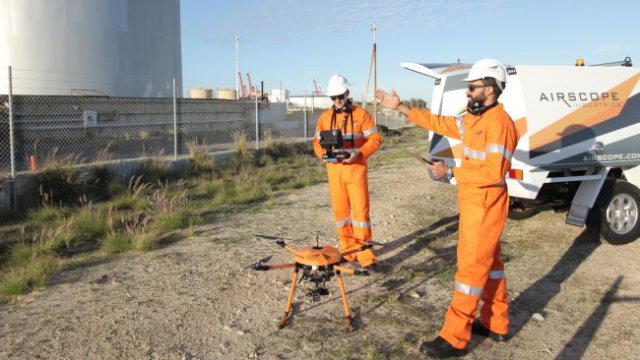When a tiny hobbyist drone revealed the damage inside Christchurch Cathedral in New Zealand, just after the 2011 earthquake, very few had an inkling of the enormous potential these flying objects had to emerge as a major commercial infrastructure inspection tool.
That potential is being tapped by a fledgling West Australian firm, Airscope Industries, whose founder Chris Leslie began flying at age 15. He was too young to drive so his family had to drive him to the local airfield and at 24 Mr Leslie was one of the youngest commercial airline captains, flying for Qantas subsidiary Network Aviation across WA.
But the gig didn’t last long. Within a year, Mr Leslie had enough and wanted out.
“I got there (piloting) at such a young age through hard work and a bit of luck, but I realised I need to be challenged, I can’t be doing this for the next 40 years of my life,” Mr Leslie said.
“So I was looking around for opportunities, and I stumbled across the UAV (unmanned aerial vehicle) industry.”
Over the course of five months Mr Leslie compiled a profile of how different sectors might best use commercial drones. Airscope was born in March last year and Mr Leslie plans to build a “drone airline” specialising in infrastructure inspections for industry. Mr Leslie said he wanted to imbue Airscope with a traditional airline culture. “We’ve created a full airline model. We internally train our pilots, our inspectors and our staff and put them through our safety management systems.”
The company has 27 staff ranging from full time to casual.
“A lot of those staff are either ex-military pilots, ex-commercial airline pilots, operational staff, safety managers from the mines — we have an array of people working together,” he said.
“And it’s not just about the technology. We run our interview process exactly as you would if you were going into Qantas or Jetstar.”
Mr Leslie said a lack of jobs in the aviation sector brought many commercial pilots to the UAV industry.
Nine of Airscope’s flyers are former or current commercial or private airline pilots and Mr Leslie aims to have 15 aboard by June with a goal of 100 pilots in Australia and New Zealand in three years. One particular area of specialty for drones, according to Mr Leslie, is the inspection of power poles and Airscope is currently involved in a pilot program to inspect 100 poles. “There’s 9.5 million power poles in Australia and we want to inspect every one of them,” he said.
Also on the agenda are drone inspections of wind turbines, oil rigs, conveyor belts, sewage plants, water infrastructure, warehouses, shopping centre air conditioning systems and heritage listed buildings.
Airscope Industries has so far won six contracts at various stages of implementation, with one potentially involved in monitoring for sharks.
According to Mr Leslie, one of the advantages of using drones was it gave industry specialists a unique perspective on monitoring a situation or an asset, which more often than not led to swift troubleshooting.
“We want to position an inspector or a highly educated technician and give them an ability to position the camera two or three metres away from an asset, and use the camera to make informed decisions,” he said.
“We work out the flight angles and what data can be captured with various sensors on the aircraft in order to collate proper data. It’s very much in test phase.”
Investor and soon-to-be company director Julio De Laffitte said the Perth-based company planned to expand to the east coast next year.
Source: The Australian

